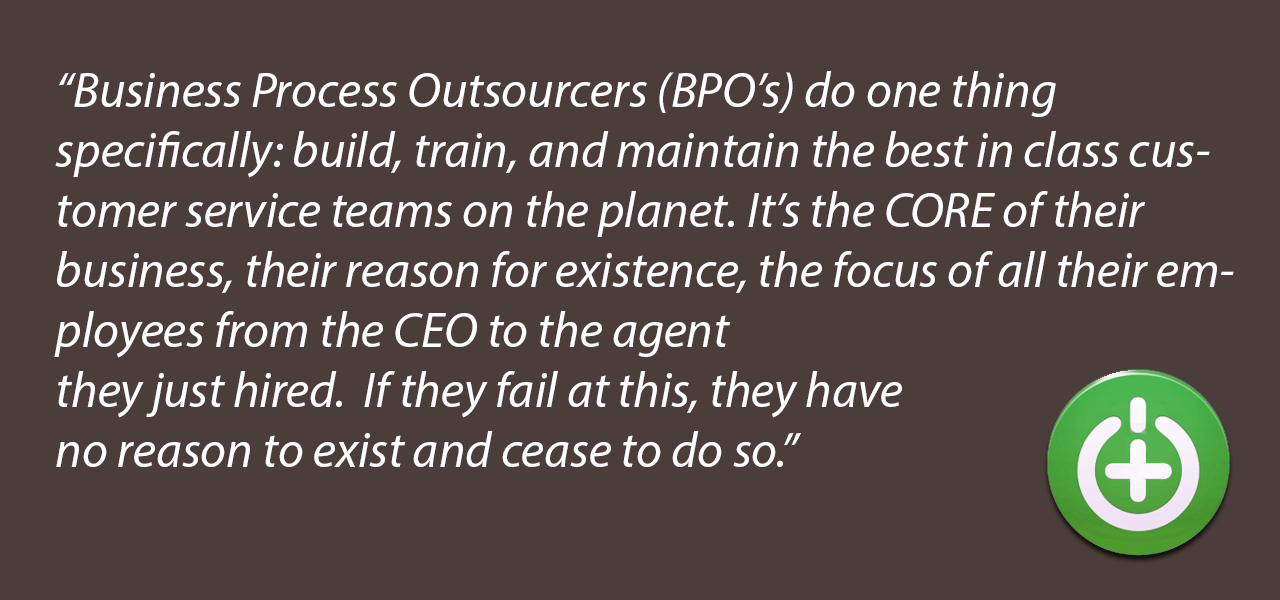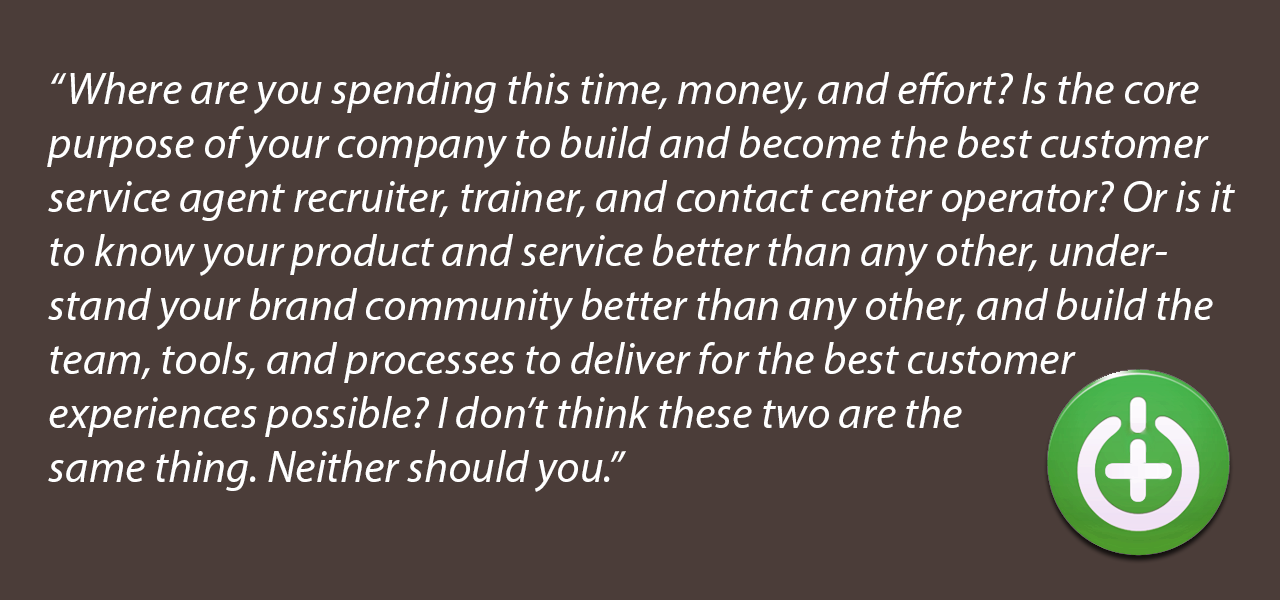Let’s take a moment to set something straight:
Outsourcing customer support isn’t BAD or WRONG.
I’m constantly amazed at the level of misunderstanding that exists in relation to the concept of customer service outsourcing. From CEO’s to career customer service managers, I’ve encountered wall after wall of carefully constructed opinion in opposition to the idea of outsourcing support. While most of these come from a pure desire to to the best thing for the customer, the majority stem from misinformation, ignorance, and/or a previous poor experience with the practice. Yes, outsourcing can be done badly and handled very wrong, but that’s on the business not on the outsourcer. When understood at its core for what it is, common sense will show us that when done correctly outsourcing can be a catalyzing source for increased positive customer engagement, far surpassing what any company could do on their own. In this three part series, I’m hoping to outline and educate a bit on the positives of contact center outsourcing, and hopefully clear up some uninformed confusion.
In this first stab, I’ll focus on the subject of: CORE.
Last time I checked the majority of companies I’ve come across do not develop, manufacture, and construct their own phone systems. Most companies I know also don’t build, manage, and maintain their own data server warehouses…otherwise I don’t imagine Amazon Web Services would be becoming the cloud powerhouse that they are.
Why?
If you ask their executive teams they’ll quickly reply that “this is not our CORE competency”, “not our company’s purpose”, “not the focus of the business”. True, bravo! The fact is that there ARE companies out there whose sole purpose for being is to build and maintain the best telephony solutions in the market, to provide the best CRM solution, the best/most secure data warehouses, the best widgets and do-hickeys around. Furthermore, the time, money, and effort needed to reinvent these “wheels” would be an incredible waste of company resources when they can simply take advantage of the years of development and effort of their vendor partners. As such, these same dollars and efforts are retained to be focused back on the CORE: that special something that makes company “a” and company “b” the best at what they do.
Business Process Outsourcers (BPO’s) do one thing specifically: build, train, and maintain the best in class customer service teams on the planet. It’s the CORE of their business, their reason for existence, the focus of all their employees from the CEO to the agent they just hired. If they fail at this, they have no reason to exist and cease to do so. The larger BPO’s in the field have been doing it for longer than most of the unicorns in the Bay Area have even existed; have serviced more companies, products, and campaigns than most of us will ever work with in our entire working lives. How naïve does a person have to be to think that they can easily setup and deliver better best practices around customer support operations models than companies with this level of exposure and experience?
That said, I’ll pause to ground the conversation back into your business. The truth is that your product, your service, your purpose for existence as a company is your CORE. No one on this earth should know it better than you. With any business, you’re special sauce breaks down into PEOPLE, TOOLS, and PROCESSES. These components are the driver, engine, and fuel behind what you do. It would be equally naïve to think that you could simply walk up to a BPO and hand them the keys to your customer service requirements and expect them to deliver a positive experience. After all, they are YOUR customers.
As with pretty much everything in life, the magic is in the details. It’s how you cut up the cake.
PEOPLE: Your contact center agents are the face of your company: They are the company to the customer in the moment that an exchange takes place so getting the right profile is critical.
TOOLS: Your toolset ultimately decides whether your agents are empowered to actually help and support your customers experience with your company, or simply to manage a constant barrage of complaints powerless to do anything about them.
PROCESSES: The happiest agents on the planet are the ones who feel fully trained and capable to do their jobs. They know their stuff, they have the tools to do what’s needed, and they have clear processes on how that should all happen.
So, once you know what you want your customer experience to look like: the type of agent profile you want to build your team of, the most integrated and efficient issue tracking and tech stack solutions possible, and clear cut process designs that meet these goals…you’re ready to outsource intelligently. Rather than dropping your support responsibility over the fence, you carefully manage and select a partner or partners (I’ll write on this another time), and establish a mutually beneficial relationship with the outsourcer; ideally maintaining in-house those customer contact needs that are new, un-processed, difficult, extremely integrated into the business, and possibly sensitive (although, there are times you’re way better off outsourcing some of the sensitive stuff for many, many reasons – I’ll write more on that another time, as well).
In the end you create a relationship with your BPO partner that integrates the teams together – the experience becoming seamless with excellent communications, consistency, and most importantly CULTURE (your culture).
While working for a division of Electronic Arts a few years ago, I was leading the setup of a customer contact solution for a product launch that would ultimately result in a customer growth pattern of zero to 2.6 million customers within six weeks, with a propensity to contact of 100%. How do you prepare for and survive that kind of launch? CAREFULLY. You plan exceptionally well, and then you execute exceptionally well.
Training was critical. Helping the internal Tier 3, external Tier 2 and 1 agents know the product, tools, and most importantly the processes as well as possible for the fateful launch day was paramount. I had carefully begun to build my team of trainers (best in the industry), and they had already started on building and preparing our training curriculum. I tried to warn them, but they were confident in their ability and experience. They believed that between the three of them, they knew the best practices for establishing the right curriculum for our needs. Once they had finished, we had our BPO partners out to do “train the trainer” sessions. After two days in the room together, my team sheepishly entered my office and shared that they were going to completely re-work the training. Why? In the process of working with the trainers from Teleperformance and Sitel, they were exposed to the best training practices of hundreds of other companies with which our BPO’s had worked with. The “train the trainer” sessions had become a mutual masterclass in the absolute most effective training processes in customer service agent training to date, forcing them to reconsider their plans for the better.
I once had an executive tell me that their support agents were “special”, that they were carefully selected and that no BPO could ever achieve the team building process they had accomplished. It took all I had not to roll my eyes and hold in a groan of frustration. Tomorrow (just one day), the majority of the big BPO’s will interview and screen more customer service agents through their recruiting process than most companies will see candidates in their entire company existence (and I’m including every role in their company collectively, much less just contact center agent candidates). We’re talking literally thousands of screenings per day, with exceptional processes to select the best of the best, honed and polished carefully over operational demands spanning decades, in some cases. If you know the profile of the agent you want, they can and will fulfill these agent needs far better than any company can by themselves. Remember, again, this is what they do. Every. Single. Day. It’s their CORE.
Outsourcing is not a one way street. It’s a relationship you set out on. Just like the relationship you hope to build with your customer, you must have a mutual seamless partnership with your BPO partner.
Finally, statistics tell us that by 2020, customer experience will overtake price and product as the key brand differentiator (http://www.walkerinfo.com/customers2020/). So, I have to ask, are you doing everything you can right now to differentiate the experience your customer has with you? Where are you spending this time, money, and effort? Is the core purpose of your company to build and become the best customer service agent recruiter, trainer, and contact center operator? Or is it to know your product and service better than any other, understand your brand community better than any other, and build the team, tools, and processes to deliver for the best customer experiences possible? I don’t think these two are the same thing. Neither should you.
So I’ll ask, do you want to setup your own phone system, lines, switches, and routers…or can you define what it should look like, sound like, and perform like – and trust the BT’s of the world to deliver on the rest?
I’ll leave that decision to you.



